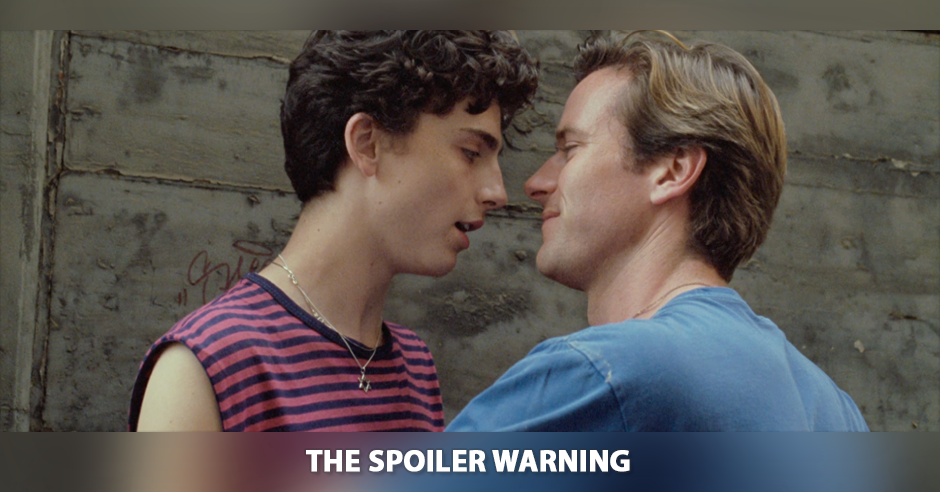Here’s a paradox for you: critics often shout most effusively about films which are tonally incompatible with shouting. The sturdy biopic anchored by a key, nuanced performance; the unassuming indie which plucks heartstrings but refuses to tug. They resonate because they’re appropriately small, showing quiet restraint on the whole so their subtle excesses feel, by comparison, enormous. In a cinematic landscape filled with over-the-top everything, it’s refreshing to stumble into something so assuredly gentle; it makes you want to shout “LOOK AT THIS RARE GEM” from the rooftops. But what about the people who heed your advice? Relocated to the landscape of Things Shouted From Rooftops, subtlety suddenly feels a bit anticlimactic. “Pretty great” gets demoted to “no big deal” gets demoted to “overrated” gets demoted to Shakespeare In Love. It’s hard to write about smallness in all caps.
I deliberately drowned out the awards buzz for Call Me By Your Name, and I hope you do the same. Because this is precisely the sort of movie—slow, personal, insistently specific—that would be crushed under all that hype, and things this delicate are worth protecting. Go in fresh and you’ll discover a lovely little coming of age flick: tenderly acted, gorgeously shot, passionate, and flawed. It’s 1983 and Elio is a precocious seventeen-year-old who lives in Italy with his hyper-literate parents. He’s exactly the sort of person the well-traveled, adolescent son of an archaeology professor would be, a contradictory jumble of know-it-all cool and eye-averting timidity. He moves through the world as if dancing to a New Wave Baby Driver soundtrack, “gliding” with all the clunkiness of someone who desperately wants to look weightless. He’s well read, visibly. He’s bored, loudly. He somehow manages to make playing piano ironic. He knows just about everything—except, of course, for the things that matter. What matters in this case is Oliver, a graduate student staying in his family’s house. Oliver isn’t self-consciously anything, is cool as stone. In fact, he’s effectively a living, breathing statue: a silent symbol of Platonic personhood, studied more intently by Elio than any sculpture his dad might unearth. He looks at Oliver and it’s not quite clear whether he wants to be rescued by him or to touch him or to become him. Maybe his particular brand of wanting is intransitive, a state of being like “seventeen” or “aching” or “unanchored”. Seeing Oliver makes him want.
“Coming of age” might be a misleading label for this: Elio doesn’t learn about personal responsibility, or coping with an overprotective mother, or carving out his future independence a la Lady Bird. What he comes into is more specific than age. It’s presence, physicality, touch. Like 2015’s Carol, Call Me By Your Name is less concerned with romance than with the way romance shapes a young person’s sense of self. What it catalyzes in their relationship to the world, to the body and its wants. So it’s appropriate that everything in this film screams “touch me”: the lush greenblueyellows of Northern Italy, the haunting Sufjan Stevens score, the countless scenes of swimming and eating shot on grainy 35mm. Texture is everything here, and for the first half Luca Guadagnino is mostly content to let us soak in it (often with aimless indulgence, which is sure to aggravate some viewers.) But eventually all that wanting reaches a tipping point, climbing to a third act that’s just about as powerful as anything I’ve seen all year. Michael Stuhlbarg will rightly make you cry, but Timothée Chalamet’s performance (showing some truly incredible emotional range) did much more than that for me. It lodged inside, somewhere, and it’s still doing its work.
I don’t think this is the best film of the year. I also don’t think it ever set out to be anything so lofty; it knows exactly what story it wants to tell, and it narrows in on that to the exclusion of all else. So much so, that even my gnawing reservations (particularly the one about age gaps) felt weirdly irrelevant while I watched. I can’t promise you’ll feel the same, and would fault no one for having a negative reaction to this. But for me, for this particular story, everything meshed beautifully. You can listen to Chris and my loud, windy, 75-mile-per-hour 2am review in a bonus episode of The Spoiler Warning.
